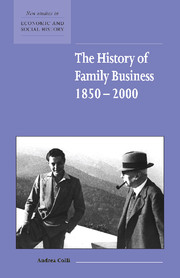Book contents
- Frontmatter
- Contents
- Introduction
- 1 Family business: nature and structure
- 2 Geographical, sectoral, and dimensional distribution of family firms
- 3 Family firms in the era of managerial enterprise
- 4 Conclusions
- Bibliographical essay
- Bibliography
- Index
- New Studies in Economic and Social History
- Previously published as Studies in Economic and Social History
- Economic History Society
3 - Family firms in the era of managerial enterprise
Published online by Cambridge University Press: 14 January 2010
- Frontmatter
- Contents
- Introduction
- 1 Family business: nature and structure
- 2 Geographical, sectoral, and dimensional distribution of family firms
- 3 Family firms in the era of managerial enterprise
- 4 Conclusions
- Bibliographical essay
- Bibliography
- Index
- New Studies in Economic and Social History
- Previously published as Studies in Economic and Social History
- Economic History Society
Summary
Almost fifty years ago, in her seminal work on the theory of the growth of the firm, Edith Penrose addressed the problem of the organisational complexity of the firm by pointing out the need for a definition of exactly what a big firm is (Penrose 1959: 17–19). She then introduced the distinction between ‘entrepreneurial versus managerial competence’. For Penrose, a firm is not by its nature committed to growth. It is the entrepreneur's desire for profit and power, associated with technological evolution and market expansion, that pushes him (or her) to build up a large organisation based upon administrative efficiency. Thus, even if firms ‘have been operating successfully for several decades under competent and even imaginative management’, they do not fully achieve the opportunities for expansion, since their owners ‘have been content with a comfortable profit’ and, above all, ‘have been unwilling to … raise capital through procedures that would have reduced their control over their firms’ (1959: 34). Very good entrepreneurs as well as hard-working, creative managers have in this way often been an obstacle to a firm's growth, simply because their principal motivation was not profit-making and they did not fully exploit the firm's resources by, for example, searching for new products or markets.
In Penrose's perspective, however, the entrepreneurial factor is the ‘residue’ explaining the initial success of a firm in terms of versatility (imagination, timing, and so on), fund-raising (the ability to obtain financial resources during the initial stages of the activity), and ambition (1959: 39ff.).
- Type
- Chapter
- Information
- The History of Family Business, 1850–2000 , pp. 49 - 72Publisher: Cambridge University PressPrint publication year: 2002

